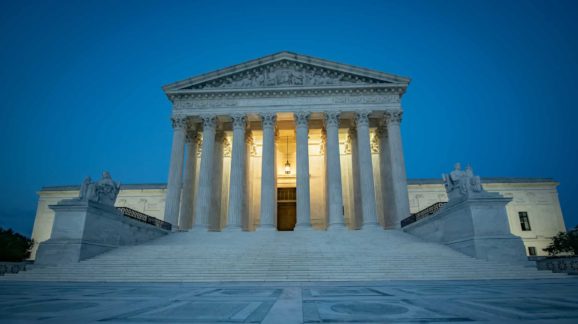Supreme Court Blocks Biden Vaccine Mandate, Cites CEI-Related Case on Separation of Powers

Photo Credit: Getty
The U.S. Supreme Court today blocked the Biden administration’s controversial test-or-vaccine mandate to be imposed on countless employers nationwide – and cited to a 2010 case in which CEI was involved. Competitive Enterprise Institute legal and labor experts praised today’s ruling and explained the significance of the 2010 case.
Statement by Sam Kazman, CEI general counsel:
“Over 15 years ago, CEI was co-counsel in a constitutional challenge to the Public Company Accounting Oversight Board, a creation of the Sarbanes-Oxley Act. That challenge culminated in the Supreme Court’s 2010 Free Enterprise Fund decision, 561 U.S. 477. On the basis of the Constitution’s separation of powers, the Court held that members of the board could not be protected by Congress from presidential removal at will.
“We are gratified to see that this ruling has legs. Two years ago it was heavily cited by the Supreme Court in holding that the head of the Consumer Financial Protection Bureau could be removed at will by the president (Seila Law v. CFPB). And today the case played a key role in the Court’s stay of the Biden administration’s attempt to mandate COVID vaccines for 84 million of the nation’s workers (NFIB v. Dept. of Labor). The Court cites to the Free Enterprise Fund case for the proposition that an agency’s assertion of unprecedented and incredibly broad power raises a red flag as to whether the agency has congressional authority for what it’s attempting to do.
“The Free Enterprise Fund case has legs. CEI is glad to have had a hand in it, and we hope it keeps marching on.”
Statement by Joel Zinberg, CEI senior fellow:
“Today’s decision in the OSHA case confirms that the Supreme Court intends to limit administrative agencies’ authority to make broad policy pronouncements and regulations when Congress has not clearly delegated that authority to them. While today’s decision deals with OSHA regulation in the workplace, the Court, quoting its earlier decision in the CDC eviction moratorium case (Alabama Assn. of Realtors v. Department of Health and Human Servs.), applied the ‘major question doctrine,’ which requires Congress to ‘speak clearly’ in its statutory language if it intends an agency ‘to exercise powers of vast economic and political significance’. This sets a significant bar for broad policy actions by all executive branch agencies, not just OSHA, and signals a significant decrease in the power of the administrative state.”
Statement by Sean Higgins, CEI labor policy expert:
“The Supreme Court’s ruling invalidating the Biden administration’s vaccination mandate was a major win for American workers’ rights and the broader economy. The mandate would have potentially resulted in untold thousands of people being fired from their jobs at the same moment that companies across the nation are struggling just to fill the pre-existing job openings. Workers who resist vaccination should reconsider their position, but the Biden administration ‘or else lose your job!’ policy was precisely the wrong way to go about persuading them.”
Statement by Devin Watkins, CEI attorney:
“The Supreme Court properly blocked OSHA from being a roving public health regulator for anyone who works. Such authority is properly left to the states to decide under the police power. The people, in deciding which state to live in, already have choice over how much control government assumes over medical choices – like vaccinations – that impact others.”
Related:
OSHA Cannot Constitutionally Coerce People into Vaccinations